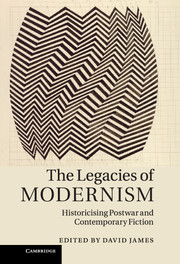Book contents
- Frontmatter
- Contents
- Notes on contributors
- Acknowledgements
- Introduction: mapping modernist continuities
- Part I Early legacies: inheriting modernism at mid century and beyond
- Part II Modernist aesthetics in transition: character, perception, innovation
- Part III Reassessing the ethics of modernist fiction
- Part IV Modernism's global afterlives
- Chapter 11 Fictions of global crisis
- Chapter 12 Representing slums and home: Chris Abani's GraceLand
- Chapter 13 For translation: Virginia Woolf, J. M. Coetzee and transnational comparison
- Epilogue Finding the dreadfully real
- Index
- References
Chapter 11 - Fictions of global crisis
from Part IV - Modernism's global afterlives
Published online by Cambridge University Press: 05 November 2011
- Frontmatter
- Contents
- Notes on contributors
- Acknowledgements
- Introduction: mapping modernist continuities
- Part I Early legacies: inheriting modernism at mid century and beyond
- Part II Modernist aesthetics in transition: character, perception, innovation
- Part III Reassessing the ethics of modernist fiction
- Part IV Modernism's global afterlives
- Chapter 11 Fictions of global crisis
- Chapter 12 Representing slums and home: Chris Abani's GraceLand
- Chapter 13 For translation: Virginia Woolf, J. M. Coetzee and transnational comparison
- Epilogue Finding the dreadfully real
- Index
- References
Summary
I
A growing body of contemporary fiction draws on the many discourses of global crisis whose rhetoric of destruction, prediction and transformation and schemes for prevention dominate our news media: economic collapse, AIDS, global warming, terrorism, genocide, refugee migrations, nuclear war, even the threat of asteroids, all provide material for novelists. Representing such abrupt, catastrophic change can absorb so much of the novel's energies that its form, as well as the world it depicts, is tested to breaking point, making it possible not only to evaluate the myths and metaphors of the prophetic rhetoric that circulates in our public spheres, but also to discern through the consequent fractures of form contours of otherwise hard to elicit aesthetic assumptions about how novels can represent the complexity of the societies of late modernity, the kinds of cultural work contemporary novels expect to do, and the lasting influences of modernist fiction's templates on the contemporary novel. Globalisation of politics, markets and communications, coupled with the massive flow of peoples across the world as migrant workers, have created what Arjun Appadurai calls ‘unruly economic flows’. Arundhati Roy asks: ‘Who can translate cash-flow charts and scintillating boardroom speeches into real stories about real people with real lives? Stories about what it's like to lose your home, your land, your job, your dignity, your past, and your future to an invisible force. To someone or something you can't see. You can't hate. You can't even imagine.’ Disaster is a trope that attempts such translation; signifying not only destruction but also pathologies of collective agency, disaster scenarios point to failures of comprehension, broken communications, cultural incommensurabilites and other damage to global interdependence.
Cormac McCarthy's Pulitzer-prizewinning novel The Road (2006), one of the most unrelieved bleak prophecies in this metagenre, puts all its imaginative energies into imagining the worst consequences of such pathologies. It is so permeated with the ashes and bones of a ruined America that a review from Time magazine cited on the cover of the American edition (along with many other enthusiastic endorsements) picks out this feature for specific praise, saying, ‘disaster has never felt more physically and spiritually real’. Making disaster real: this is as worthwhile as the more commonplace demand for real characters. The novel itself avoids such totalising descriptors as ‘disaster’, relying instead on harsh visual images of a devastated landscape that figure weeds, ruins such as the road that is now no more than ‘plates of cracked macadam showing through the drifts of ash’, and worst of all, the many tell-tale signs of widespread cannibalism: ‘grey coils of viscera where the slain had been field-dressed and hauled away’. Remnants of ethical life are embodied in the story of a father attempting to take his son to a place of safety. In a rare moment of reflection the father addresses whatever god might be listening, saying ‘Please don't tell me how the story ends’, thereby enabling the novel to suggest that fictional narrative is a form of humanity, since the father (who embodies a remnant of humanity) equates living a life with the capacity to represent it as a narrative. He moves efficiently though numbly through this wasteland, rarely revealing any emotion towards the disaster, husbanding his affective resources for the care of his so much less competent son, who unlike his father does respond emotionally to the disaster around him, repeatedly displaying some version of ‘his little dance of terror’. What we do perceive through the father's point of view is the loss of history in this world where ‘tracks don't stay in the ash’, and everything is ‘late history’, signified by corpses or irrelevant old newspapers.
- Type
- Chapter
- Information
- The Legacies of ModernismHistoricising Postwar and Contemporary Fiction, pp. 205 - 224Publisher: Cambridge University PressPrint publication year: 2011



